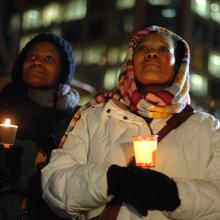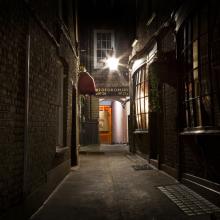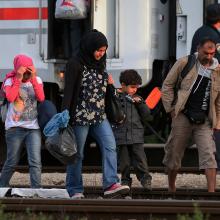Advent
If I’ve learned anything since my time in Rome, it’s that people — not just Catholics — are hungering to connect peace with justice. This is why those of us who traveled to Rome just before the election, accompanied by Stockton, Calif., Bishop Stephen Blaire, and Houma-Thibodaux, La., Bishop Shelton Fabre, are preparing for a regional WMPM meeting in Modesto, Calif., in February.

Image via NYCStock/Shutterstock.com
Dec. 4 was a beautiful reminder, in the long struggle for justice, that, no matter how long we wait, God hears our cry. And love and justice will win.
A few weeks ago, Chief Arvol Looking Horse issued an invitation to clergy and faith leaders to stand in solidarity with the people of Standing Rock. He said he was hoping maybe 100 would respond. But I joined thousands, in a procession of faith leaders, to gather around the sacred fire at the Oceti Sakowin Camp at Standing Rock.
I knew something special was happening here.
For many Christians who observe the liturgical season of Advent, leading up to Christmas, an Advent devotional is a beloved companion.
Such devotionals typically include a short Scripture reading and reflection on the birth of Jesus.
But most are “crap,” according to the Rev. Jason Chesnut of Baltimore.
For the last two thousand years, our salvation has come via that peaceful, sleeping baby, weary from being a tiny human. A revolution for a better world begins from the most ordinary of miracles, from small, gasping breaths after a good cry. This is where we will rise, those of us hopeless from the election results, from the margins, from the outside, from the ordinary, miraculous moments of our lives.

Image via Adam Cohn/Flickr
The intersection between present and future is a tense and frustrating space to live in. Yet, that space makes a demand on us. Faithful moral identity that is not wedded to moral social action misses the Gospel’s kingdom vision.

Image via Sergei Bachlakov/Shutterstock.com
Perhaps the most important role of the prophet is rousing us from our stupor. When we get tired, when we are weary of resisting, when we are told over and over again that this is how things are going to be, the prophet’s call is clear. God has something better for us. Something liberating. Something just. Something transformative.

Image via Twitter/@SmithsonianAPA
Why and how did Greg’s post resonate with so many people on the meme’s second time around the Internet? Why did it take so much darkness before something profoundly positive happened? I think I come back to two powerful resources available to us as a church, if we have the courage to embrace it.

Image via chrisdorney/Shutterstock.com
But perhaps the reason why the darkness cannot understand or overcome the Light is because it will not and cannot imagine reducing itself or condescend to be like its enemy in order to overcome it. Scripture describes an adversary who wanted to be like God, but doesn’t seem to understand that God’s very nature is “gentle and humble and heart.” The nature of darkness is not a generous one. It doesn’t offer light or heat or allow other things to grow. It isolates.
For the longest time, I was convinced that Paul the evangelist totally whiffed on one of his most beautiful passages: the one where he emphasizes that love is what really matters, and then lists some of its defining traits. He starts out by saying that love is … patient.
Really?
He goes on to list other traits, such as kindness. He also says what it’s not: rude, selfish, snobbish, brooding, quick to give up on someone. And it’s all really good stuff, written with such grace. But I’ve always had a difficult time with that first word.
Patient. Love is patient.

Syrian refugee family in Croatia, Sept. 17. Photoman29 / Shutterstock.com
If Donald Trump had been Pharaoh of Egypt, the Holy Family never would have escaped from Herod’s persecution. Jews would have been prohibited from entering the country. Christmas features the story of a family from the Middle East leaving a homeland in fear and seeking refuge is a foreign land, just as millions do today.
If you visit Egypt and its ancient Coptic Church, you’ll see images of the Holy Family everywhere: Joseph, Mary — always on a donkey — and the infant Jesus. They are moving, wandering. You’ll find pictures of them passing by the pyramids. Egyptian Christians treasure this story for theirs is the land that offered welcome and hospitality to the Son of God when he was a refugee.

Image via Peerayot/Shutterstock.com
For the first week of Advent, my wife Amy preached about hope. She pointed out that having hope doesn’t mean necessarily that we see a way out of suffering. It does, however, give us a reason to try to keep working through it. We have to believe there’s another side to it. Another possibility. The potential for a new reality.
And that reality will never, ever be realized by responding to violence with more violence. It may make us feel better in the moment. It may seem to offer short-term relief. But ultimately, it makes everyone that participates become a little bit of what they hate. And the cycle continues.
Which story will we choose to try to live into?

Image via Charts and BG/Shutterstock.com
I wonder if God calls us to celebrate waiting because the lie we’re all most susceptible to is that if we just get what we want, we’ll be ok. When this is our mentality, we actually forget to live. We become so future-oriented that we can ignore the presence of God in our midst and the signs of the Divine work in this world. We can miss out on the good things he provides daily, hourly.

Image via Babin/Shutterstock.com
If this is your first Advent, or if it has been awhile, let me catch you up. Advent is the season of expectant waiting before Christmas. It’s a time to wake up, slow down, sit still, listen, and wait. A kind of expected, engaged waiting, with one another. And the first Sunday of Advent — celebrated on the four Sundays before Christmas — always starts with apocalyptic end-of-world scenarios.
Again, an odd way to start. But I think there is wisdom in it. The ancients saw fit to remind us of the harried, violent world into which the Christ child was born. Which, if we are honest, is also like the world in which we find ourselves.
Violence, brokenness, and heartache can take many forms. Each of us experience the heartache of recent weeks. Maybe it was a year-long affair; or Paris; or a lost job; or mass gun violence; or depression; or Laquan McDonald in Chicago, Ill.; or Garret Swasey in Colorado Springs, Colo.

jorisvo / Shutterstock.com
ONE OF THE BEDROCK assertions of the Christian faith is that the kingdom of God is coming.
Jesus announced God’s reign, and embodied it, and brought it among us, but it is not here yet in full. The world’s brokenness and our own selfishness are testament enough that the kingdom is not here in full. But it is coming. And there’s not a thing we can do to hurry it, or stop it, or even delay it. We can, however, join in with it. That’s the best recipe for how to be a human being.
Advent’s reliable annual return is like the kingdom in its future certainty. The blue or purple paraments, the hymns in minor key, the candlelight, the longer nights—they all return, annually, like an old friend. Advent is a season of longing. The church places herself in the position of Israel, crying out for a savior. The hymns express this longing (“O Come Emmanuel, and ransom captive Israel, that mourns in lowly exile here”). Some churches have a “longest night” service on or around Dec. 21 for those who have experienced especially acute grief in the past year. Advent reminds us that life is not all cheerfulness, as if we needed reminding. It’s also sorrow, longing, waiting, and hoping.
Then Advent returns, ready or not. Just like Jesus and the reign he’ll soon bring in full. It’ll be here before you know it. And it’ll amplify the best parts of human life. It will shear off the worst parts. And it will make the world the one God dreams about.

Prazis / Shutterstock
THE FAMILIES arriving at the Sacred Heart Humanitarian Respite Center in McAllen, Texas, all come with one thing in common—a high sense of hope and faith in God. Much like the Holy Family, these families were forced to flee because they feared for the lives of their children.
Catholic Charities of the Rio Grande Valley began a humanitarian crisis-relief program in the summer of 2014 to respond to the influx of immigrants crossing the border who didn’t have a place to rest. Many are fleeing the violence in Central America. In El Salvador, for example, the murder rate has more than doubled since 2012 and soon will pass that of Honduras, which has the highest murder rate per capita in the world.
With the help of Sacred Heart Catholic Church and hundreds of volunteers, we were able to open a place of safety for refugees before they continue on their journey. For these holy families, it is the love for their children that moves them to face all possible dangers by traveling north.
In the biblical story, St. Joseph was a “just man” and faithful. He was forewarned of Herod’s imperial violence and fled the country to protect his wife and infant son. At our center the fathers are also men of profound dedication and attentiveness to the needs of their families.
One young dad had left his home in Central America with his pregnant wife and their two little girls. His wife gave birth in Mexico. As they prepared to cross the Rio Grande into the U.S., he and the baby became separated from his wife and two daughters. He lost them. When he and the 1-month-old baby arrived at our center, he had no idea if his wife and two little girls were alive or if he would ever see them again.

Volkova / Shutterstock
THE MONTH of December brings with it the season of Advent and Christmas. It’s always been my favorite time of the year, because it shows us powerfully and practically how our Christian faith entered the world. The incarnation is unique among world religions. The way I like to say it: In Christ, God hits the streets. Christmas gives Christians the annual opportunity to remember the incarnation of God’s love breaking into the world—how it did and how it still can.
Advent is about waiting, and Christmas brings the newborn who announces a new order meant to turn the world upside down—and our lives with it. Christmas always renews my commitment to bring that revolutionary love into a world that so desperately needs it, and into my own life again.
In the bustle of our daily lives, with all of the distractions and struggles that come our way—even in Christian ministries—it is so easy for us to lose sight of the transforming love embodied in the person of Christ. So it’s vitally important that we have this season to remember and re-encounter and re-center ourselves on the heart of our faith: God breaking into history to transform it, and us, in the person of Jesus.
Christmas always reminds me that being a Christian means being a follower of Jesus, willing to allow that message of the reign of God, a new order of things, to break in again and again.
While that statement about following Jesus may seem obvious, how many of us really focus, on a daily basis, on living our lives as Jesus did? On saying what he said, doing what he did, behaving as he behaved? On treating people in the way Jesus treated people?

Bychykhin Olexandr / Shutterstock
ADVENT IS QUICKLY APPROACHING as Pentecost draws to a close. The sweeping, turbulent flow of the Spirit’s work in the church slows down. These weeks are marked by attention to widows, pain, and relationships, and to the up-close, daily grind of life. We zoom in. No sweeping theological treatises here, except those that alert us that Jesus’ second coming embodies all that the world needs to be made right and whole. Pastoral care is the emphasis now. Brush off the dust from your toolbox of “reflective listening,” “productive questions,” and “fogging.” This means no sharp dichotomies between what we do in worship and what we do throughout the week. Pastoral. Prophetic. Administrative. These will need to be one hat, as they always should be.
Scripture reminds us these weeks that our preaching ought always to be about care, about counsel, about presence. Why? Because, after all, we preach to people, not aliens. The goal of preaching is incarnation—the kind that enters the world through a teenage, unwed, poor woman’s womb, into a pig trough with animals and outdoor smells. The church’s message will need to be no less earthy, involved, reaching the ground of people’s actual lives. We’ll need to speak to all of the contradiction, heartache, and tears along with the opportunities, transitions, and celebrations in folks’ lives. I pray that our messages take on flesh. O come, O come, Emmanuel!
Hope is not a feeling. It is a decision — a choice you make based on what we call faith or moral conscience, whatever most deeply motivates you.
I have said that for many years, but this Advent and Christmas season tests my words — even in my own heart.
This is not a time that many of us are feeling a great deal of hope. I hear that from many friends and allies as well.
In fact, many events this year feel like they have sucked the hope right out of us.
And yet, even in the midst of terrible events and stories, the possibilities of hope still exist depending on what we decide to do for reasons of faith and conscience. In fact, people of faith and conscience are already making a difference in the most difficult situations and places.
And that gives me hope. This season of Advent, in the Christian tradition, is a call to patient waiting.
Christmas is the celebration of God literally coming into the world in order to change it.
What can local churches do to support ongoing protests against, and indeed upheaval of, an unjust criminal justice system and deep-seated white supremacy? In a season that Lisa Sharon Harper recently described as “Advent as protest,” what might it mean for Christians to anticipate the coming of Christ by physically challenging oppression? For pastors all over the United States, these are the questions of the moment.
In Washington, D.C., local faith communities sought to live into the vision of Advent as protest by holding a “vigil for justice.” Although this vigil beautifully documented the capacity of the local church to advocate for justice, the way local media framed the vigil forces communities of faith to think more deeply about their understanding of solidarity.
Spread out along nearly 6.5 miles of 16th Street, hundreds of people held candles and signs in support of recent protests against racial injustice. As people passionately waved their signs or held their heads down in prayerful lament, passing cars and buses slowed to honk in support. Catching on with the theme of Advent, attendees hoped to shine light in the darkness not only to create awareness and show solidarity, but also to testify to the hope of faith.
Cecilia Choi, a member of District Church explained, “This is the time of Advent when God came and he started his work of reconciliation with us by becoming one of us. And I think it’s perfect to come out and work on reconciliation and joining with our black brothers and sisters. They’re not just our neighbors, they’re our brothers and sisters in Christ. We have such an obligation to them. I think this is an act of worship.”
When asked why she was on the streets, one woman responded, “Well, what do I say? [Laughs.] That’s the meaning of our faith! To be one with people who are suffering.” Another man called racism “the deepest sin in the United States.”
Such descriptions of the vigil reach to the core of the church’s mission to “do justice, love mercy, and walk humbly.” Here are churches standing in solidarity with those suffering at the hands of racist oppression as an “act of worship.” Here are churches bringing their resources of prayer, lament, and peace into the public sphere, challenging observers to wrestle with God’s call to justice. Yet, though the event was beautiful, the way it was framed by local media raises tough questions for churches. Contrasting this demonstration with other recent protests, one reporter said, “This protest was in contrast to many of the protests we’ve seen over the past few weeks, with groups blocking traffic and loudly chanting. This group was quiet and purposeful.”
Author's Note: As we close out Advent, when we so quickly determine what’s our legal right or what we’re owed or what “the Bible really says” when, after all, we’re just simply too quick to judge. In these days where we must affirm #BlackLivesMatter, where we must stand up for victims of rape and abuse, and where we must struggle with our LGBTQ sisters and brothers for full inclusion, sermons like this are humbly offered.
We know the Christmas story well.
Those of us that have grown up with regular, annual, church-going rhythms — we essentially hear this story once a year.
Even so, those with no regular church commitments — people from all walks of life, people of faith or no particular faith, people from varied faiths — if you asked your friend, your neighbor, your cousin, a stranger on the street, I bet at least 50 percent of the time they’d be able to share the gist of the story:
Jesus was born to a virgin named Mary.
Mary was married to a guy (named Joseph).
There were angels, and wise men, and shepherds.
And I think there was a manger.
We know this story well.
But we hear it so often it becomes rote — literally a mechanically, automatically, mindlessly routine on repetition in our brains.
Yeah, yeah, yeah — 6lb 8oz baby Jesus, in a manger, Virgin Mary, Adopted Dad Joseph, sheep, shepherds, angels, stars at night, wise men, white Christmas, Rudolph the Red Nosed Reindeer …
You get my point.
So, let’s hear the story one more time and lean in a bit to this wild world of dreams, angels, and ancient Jewish marriage contracts.






